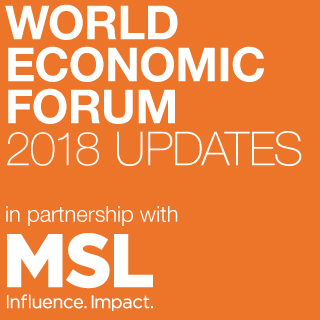MSL 24 Jan 2018 // 2:18PM GMT

I love what a new year represents. Devoid of narrative, it is just another moment in time. Once you buy into the created significance, however, it is a period of reflection, of new beginnings, and of looking ahead with a view towards the future. The theme for this year’s World Economic Forum – ‘Creating A Shared Future in a Fractured World – blends the spirit of collaboration with the dystopian phrasing that has come to signify our times. Here’s a perspective from India, a country that is developed, developing, and underdeveloped (in varying proportions), through the lens of an optimistic realist.
As a firm believer in the indomitable nature of human spirit, I don’t think the world is broken. The zeitgeist is seeing a heightened sense of awareness at loggerheads with a diluted version of the ‘truth’ and a desire to be optimistic clashing with the propensity for cynicism. And amidst all this, the collective consciousness continues to evolve.
A slew of developments – from the success of the shared economy and the rise of social enterprise – indicates a shift in the way people operate. Globally, policy is seeing the importance of sustainability and conservation and is influencing long-term consumption patterns centered on thrift rather than opulence. In India, this is evidenced by the rise of companies like Ola, Airbnb, and Zoomcar. In 2013, Sunrun CEO Lynn Jurich said, “the new status symbol isn't what you own–it's what you're smart enough not to own.” This holds true more for our youth today than ever before.
If shared consumption is transforming user behavior, then what will transform business? In my view, it is shared purpose, where collectivism meets capitalism and purpose meet profits. This is the case I am seeking to make: the infusion of social meaning into business models. I call it ‘purpose integration’. Our future, globally, is shared whether we like it or not. It is shared purpose that will lead to satisfaction with this future.
A focus on societal development does not imply philanthropy. Companies like Tesla are creating incredible value by delivering innovation, not as charity. Our systems must encourage visionaries by enabling those bold enough to dream to be bold enough to do business. In my view, economic prosperity and social cohesion are not mutually exclusive – in fact, social cohesion creates economic value.
Consider this: in 2014, the Indian government added a mandatory element to its CSR policy directing companies over a certain size in profit, turnover, or net worth to spend 2% of their average net profits on CSR. In a society that’s apathetic towards poverty by way of desensitization, it was a landmark move. Government-run programs have given corporates the chance to link their efforts to the national agenda. Brands like Hindustan Unilever have programs linked to Swachh Bharat. Dell India’s Aarambh program, linked to Digital India, is driving the benefits of PC education through programs designed for parents, teachers, and students. There are more cases in point but those would see me digress.
While the CSR policy is
comprehensive, its effectiveness would be strengthened by one amendment – coherence. The first step towards coherence is credibility which, to me, is just integrity exhibited consistently. This would mean finding the mission at the heart of a business and committing resources to it – socially, financially, and environmentally. Businesses and governments must evolve to consider the societal impact.
Realpolitik may have functional benefits, but it has lost relevance. Effectiveness and efficiency cannot override empathy without eroding trust. The Fourth Industrial Revolution isn’t going to diminish humanity by replacing people with machines, it is going to accentuate it. Leaders and policymakers must create frameworks that allow citizens to elevate their ability and quality of life. The change will need to emerge from the grassroots, from the way we teach business, politics, and design to how we educate children about power and progress.
Our world is not fractured. It is flawed, just like we are. And it is incredible, just like we are. It is the prerogative of the ‘woke’ to drive the creation, recognition, and belief of a common purpose. This year’s World Economic Forum is a remarkable opportunity. Not one to fix a ‘fractured world’, but a chance to recognize all that’s right with it and make it even better.
*Full Disclosure: MSL represents Ola, Airbnb, Swachh Bharat Mission, Dell and Hindustan Unilever (select brands and initiatives).
 Amit Misra is the CEO of MSL in India. He joined MSL in 2013.
Amit Misra is the CEO of MSL in India. He joined MSL in 2013.


































.jpg)
















